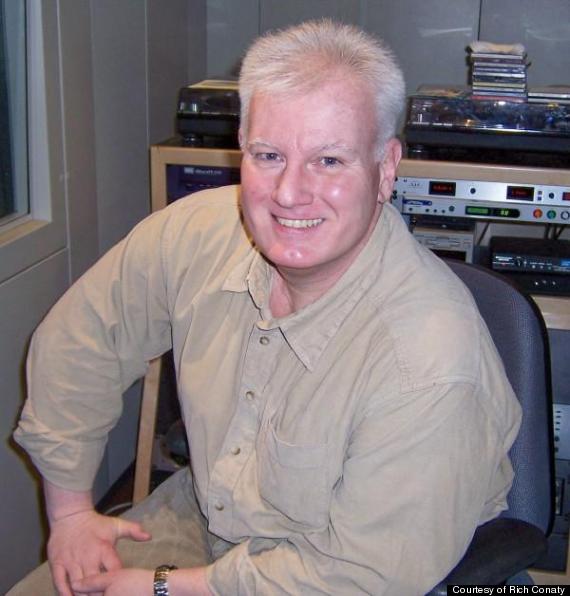
When it came time for Rich Conaty to choose a college, it wasn’t the academics, or the athletics, or even the architecture that influenced him. It was the radio station.
It was the early 1970s, and Conaty headed to Fordham University in New York, lured by its radio station WFUV and a Sunday night program called “In The Mood.”
He’d been enthralled by 1920s jazz since stumbling onto a crate of old records in the basement of his family’s home in Queens. So when he had the chance to host his own show as a Fordham freshman, there was no question what kind of music he’d be sharing with listeners. It had to be the crisp melodies and syncopated rhythms of Louis Armstrong, Bing Crosby, Fred Astaire, Bix Beiderbecke, and countless lesser-known musicians that dominated hotel ballrooms and crackling radio airwaves long before his birth.
Forty years later, Conaty is still at it, hosting “The Big Broadcast” from 8 p.m. to midnight on Sundays from WFUV studios in the Bronx. In the years since he first went on the air, Conaty, now 59, has been married and divorced, and held various broadcast-related day jobs -- though he never cared much for them. He could never match the enthusiasm or drive of his colleagues in television, who would work late into the night, fussing over camera angles. “It never meant anything to me,” he told The Huffington Post.
The music, however, meant a great deal -- enough that he was willing to host “The Big Broadcast” for nearly 20 years without pay. It has allowed him to meet and befriend some of his musical idols, including Cab Calloway and Les Paul. He has compiled and written notes for eight volumes of Big Broadcast recordings issued by Rivermont Records, a ragtime and jazz label. In 1993, he appeared on The Jon Stewart Show and shared the stage with Stewart’s next guest, Cindy Crawford.
Part of hosting a 1920s and '30s jazz show in 2013 means understanding that not everybody shares your taste. Conaty has picked up a few tricks when it comes to describing his line of work. Not everyone knows Scrappy Lambert and Bunny Berigan, but most people have at least some idea what Conaty means when he says, “Woody Allen movie music,” or “something you might hear on Boardwalk Empire.”
“People used to call it cartoon music and I’d wince at that,” Conaty said.
Conaty has no children, and lives in Hudson, N.Y., between Albany and New York City. By day, he drives a 12-passenger bus for adults with disabilities. When the weekend comes around, he begins actively planning his next broadcast. Each Sunday around 7 a.m., he begins scouring his floor-to-ceiling shelves of 78s and CDs -- a library of more than 12,000 possibilities -- inevitably ending up with way too much material for a four-hour show. So he begins to pare down.
Around 5 p.m., he drives to Fordham’s campus in the Bronx. On the way, he listens to the previous Sunday’s show.
“I have that two hours where I’m not crazed,” he said. “For some reason it relaxes me, just having that time.”
It wasn’t always that way. Years ago, listening to his own voice caused him a great deal of stress. He’d second-guess his decisions -- which songs to play and when. These days, he said, “I’m used to me. Maybe I’ve just mellowed and gotten more used to people’s shortcomings, including my own.”
When Conaty surveys his life and reflects on his accomplishments, he has moments of doubt as to whether his radio career has been a success. It’s a bit surprising if you’ve heard him on the air: passionate, animated, at ease. But for him, there’s a difference in being on the air and being out in the world.
He said going to his high school reunion made him uneasy -- hearing the conventional success stories of his former classmates, reconnecting with his former principal for the first time in decades, and telling his own story.
“I sometimes feel less successful than them,” he said. “I’m never comfortable if I meet people. I’m not good at explaining what I do.”
Despite those doubts, his love of the music justifies his work.
“It’s about finding what you love and doing it,” he said. “Les Paul was a multimillionaire who did exactly what he wanted to do. So whether you wind up as a multimillionaire or not, that’s the thing you have to do. Maybe some people never find it. I don’t think there’s any question that I’ve found what I was put here to do. There may be other things I was put here to do, but I’ve certainly got one down.”

